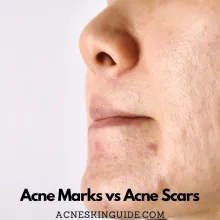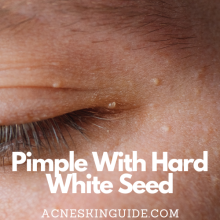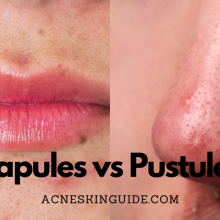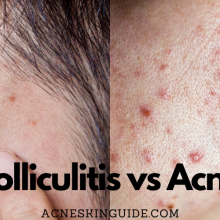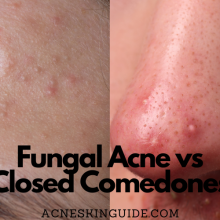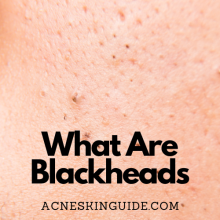Acne and Diet | Acne Skin Guide
Acne is a common skin condition influenced by factors like genetics, hormones, and increasingly, diet. Certain foods can trigger or worsen acne breakouts by promoting inflammation, hormonal imbalances, and insulin resistance. These include dairy products, high glycemic index foods, processed foods, greasy/fried foods, and inflammatory foods like red meat and alcohol. Hormonal factors like insulin resistance and fluctuations in hormones like testosterone and estrogen also play a role.
An acne-friendly diet should emphasize antioxidant-rich fruits and veggies, omega-3s, zinc, and probiotic-rich fermented foods while limiting potential triggers. Additional considerations include addressing food sensitivities, staying hydrated, managing stress, supporting gut health, and consulting professionals for supplementation. Ultimately, dietary changes can be a complementary approach to managing acne, but individual variations in triggers and hormonal responses should be considered alongside other lifestyle adjustments.
#1 Recommended Acne Treatment | #2 Recommended Acne Treatment |
 |  |

Acne and Diet – The complete Guide
Acne is a common skin condition that affects millions of people worldwide, and while it’s often associated with hormonal changes during puberty, it can persist well into adulthood. While genetics and hormones play a significant role, diet is increasingly recognized as a contributing factor to acne development and severity. In this article, we’ll explore the link between acne and diet, highlighting the foods that may trigger breakouts and the dietary approaches that can help promote clear, healthy skin.
Acne-Triggering Foods:
A. Dairy Products: Dairy products, including milk, cheese, and yogurt, have been linked to increased insulin levels and inflammation, both of which can contribute to acne. Hormones naturally present in dairy products, such as cow’s milk, may also influence hormonal imbalances that can lead to acne. However, it’s important to note that the relationship between dairy and acne may vary from person to person, and some individuals may be more sensitive to dairy than others.
B. High Glycemic Index Foods: Foods with a high glycemic index, such as refined carbohydrates, sugary snacks, and pastries, can cause spikes in blood sugar levels, leading to increased insulin production. Elevated insulin levels have been associated with hormonal fluctuations and increased sebum production, which can clog pores and contribute to acne breakouts.
C. Processed Foods: Processed foods are often loaded with inflammatory ingredients, such as trans fats, preservatives, and additives, which can exacerbate acne. These foods may also contain high levels of refined carbohydrates and unhealthy fats, further contributing to inflammation and hormonal imbalances.
D. Greasy/Fried Foods: While greasy and fried foods may not directly cause acne, they can contribute to clogged pores and inflammation, which can worsen existing acne or trigger new breakouts. The high fat content in these foods can also stimulate excess sebum production, leading to an oily complexion and potential acne flare-ups.
Inflammatory Foods and Acne:
Inflammation plays a crucial role in the development of acne, and certain foods are known to promote inflammation in the body. Examples of inflammatory foods include:
- Red meat: High in saturated fats and inflammatory compounds.
- Alcohol: Can disrupt hormone levels and contribute to inflammation.
- Refined carbohydrates: Promote oxidative stress and inflammation.
- Trans fats: Found in many processed foods and linked to increased inflammation.
By reducing the consumption of these inflammatory foods, individuals may be able to better manage their acne and reduce the severity of breakouts.
Hormonal Factors and Diet:
Hormonal imbalances, particularly those related to insulin and androgens, can contribute significantly to acne development. Diet plays a role in regulating these hormones:
A. Insulin Resistance: Diets high in refined carbohydrates and sugary foods can lead to insulin resistance, which has been associated with increased sebum production and acne. Adopting a low-glycemic diet rich in whole, unprocessed foods can help manage insulin levels and potentially improve acne.
B. Hormonal Acne: Fluctuations in hormones like testosterone and estrogen can stimulate oil gland activity and lead to hormonal acne. Certain dietary factors, such as dairy consumption and excessive sugar intake, may influence hormonal imbalances and exacerbate hormonal acne.
Acne-Fighting Diet Plan:
While there is no one-size-fits-all approach, adopting an anti-inflammatory, nutrient-dense diet can help support clear skin:
A. Skin-Friendly Foods to Include:
- Antioxidant-rich fruits and vegetables: Provide anti-inflammatory properties and support skin health.
- Omega-3-rich foods (fatty fish, walnuts, flaxseeds): Reduce inflammation and promote balanced hormone levels.
- Zinc-rich foods (oysters, beef, pumpkin seeds): Zinc plays a role in wound healing and reducing inflammation.
- Probiotic-rich fermented foods (yogurt, kefir, sauerkraut): Support gut health, which may benefit skin health.
B. Foods to Avoid or Limit:
- Dairy products
- High glycemic index foods (refined carbs, sugary snacks)
- Processed foods (fast food, packaged snacks)
- Greasy/fried foods
- Inflammatory foods (red meat, alcohol, trans fats)
C. Portion Control and Calorie Density: Overeating and consuming calorie-dense foods can contribute to inflammation and hormonal imbalances, potentially exacerbating acne. Practicing portion control and favoring nutrient-dense, high-fiber foods can help manage calorie intake and support healthy skin.
Additional Tips and Considerations:
A. Food Sensitivities and Acne: Some individuals may have sensitivities or intolerances to certain foods that can trigger or worsen acne. Keeping a food diary can help identify potential trigger foods and guide dietary adjustments.
B. Hydration and Acne: Adequate hydration is essential for overall skin health. Drinking plenty of water can help flush out toxins and support proper nutrient delivery to the skin.
C. Lifestyle Factors: Stress, lack of sleep, and other lifestyle factors can impact hormone levels and contribute to acne. Incorporating stress management techniques and prioritizing quality sleep can complement dietary changes for better skin health.
D. Gut Health and Acne: Growing evidence suggests a link between gut health and skin health. Maintaining a healthy gut microbiome through probiotic and prebiotic intake may support clear skin by reducing inflammation and promoting balanced hormone levels.
E. Dietary Supplements for Acne: While some supplements like zinc, vitamin A, and probiotics show promise in supporting skin health, it’s important to consult with a healthcare professional before self-supplementing, as excessive intake can lead to potential side effects.
Acne and Diet: Individual Differences:
It’s important to note that dietary triggers can vary from person to person. While some individuals may benefit from eliminating certain foods, others may not experience the same effects. Keeping a detailed food diary and working closely with a dermatologist or nutritionist can help identify personal acne-aggravating foods and tailor an appropriate diet plan.
Conclusion:
The link between diet and acne is becoming increasingly clear, with certain foods contributing to inflammation, hormonal imbalances, and insulin resistance – all factors that can trigger or worsen acne breakouts. By adopting a balanced, nutrient-dense diet that emphasizes skin-friendly foods and limits potential acne triggers, individuals can support clear and healthy skin from the inside out. However, it’s crucial to recognize that dietary approaches may not work for everyone, and individual variations in food sensitivities and hormonal responses should be considered. Combining dietary changes with other lifestyle adjustments, such as stress management and quality sleep, can provide a comprehensive approach to managing acne.
#1 Recommended Acne Treatment | #2 Recommended Acne Treatment |
 |  |
Summary and FAQs
Are there any specific foods that can help reduce acne scars or hyperpigmentation?
Yes, there are certain foods that may help reduce the appearance of acne scars and hyperpigmentation due to their anti-inflammatory and antioxidant properties. Here are some examples:
- Berries (e.g., blueberries, raspberries, blackberries): These are rich in antioxidants like anthocyanins, which can help neutralize free radicals and reduce inflammation, thereby promoting skin healing and fading acne scars and discoloration.
- Leafy greens (e.g., spinach, kale, broccoli): Packed with vitamins A, C, and E, as well as antioxidants like lutein and zeaxanthin, leafy greens can help protect skin cells from damage and support the regeneration of healthy skin cells, potentially improving the appearance of acne scars.
- Tomatoes: Rich in lycopene, a powerful antioxidant that can help reduce inflammation and promote skin cell turnover, potentially fading acne scars and hyperpigmentation over time.
- Fatty fish (e.g., salmon, mackerel, sardines): These are excellent sources of omega-3 fatty acids, which have anti-inflammatory properties and can help regulate oil production, potentially reducing the risk of future acne breakouts and scarring.
- Foods rich in zinc (e.g., oysters, beef, pumpkin seeds): Zinc plays a crucial role in wound healing and can help regulate oil production, potentially aiding in the fading of acne scars and hyperpigmentation.
- Foods rich in vitamin C (e.g., citrus fruits, bell peppers, strawberries): Vitamin C is an antioxidant that supports collagen production, which is essential for skin repair and the reduction of acne scars and discoloration.
It’s important to note that while a nutrient-rich diet can support skin health, severe acne scarring may require additional treatments, such as topical creams, chemical peels, or professional procedures like laser therapy or microneedling. Consulting a dermatologist is recommended for personalized advice and treatment options.
Can dietary changes alone clear up severe or cystic acne?
Dietary changes alone are unlikely to completely clear up severe or cystic acne, although they can potentially help manage the condition and reduce the frequency and severity of breakouts.
Severe and cystic acne are often caused by a complex interplay of factors, including hormonal imbalances, genetics, and an overproduction of sebum (oil) by the skin’s sebaceous glands. While diet can influence these factors to some extent, it may not be enough to fully resolve severe cases of acne without additional medical intervention.
Here are a few key points regarding the role of diet in managing severe or cystic acne:
- Dietary changes can reduce inflammation: Adopting an anti-inflammatory diet rich in antioxidants, omega-3 fatty acids, and other nutrient-dense foods may help reduce the inflammation associated with severe acne, potentially lessening the severity of breakouts.
- Low-glycemic diet can help regulate hormones: Following a low-glycemic diet that minimizes refined carbohydrates and added sugars can help regulate insulin and androgen levels, which are key hormonal factors contributing to acne.
- Eliminating potential trigger foods: Identifying and eliminating specific foods that may trigger or exacerbate acne breakouts (e.g., dairy products, processed foods, high-glycemic index foods) can be beneficial for some individuals.
However, severe or cystic acne often requires medical treatment, such as:
- Prescription topical or oral medications: Retinoids, antibiotics, and hormonal therapies like birth control pills or anti-androgen medications are commonly prescribed to manage severe acne.
- Isotretinoin (Accutane): This powerful oral medication is often used as a last resort for severe, treatment-resistant cystic acne.
- Procedural treatments: Procedures like chemical peels, laser therapy, or photodynamic therapy may be recommended to improve the appearance of severe acne and scarring.
While dietary changes can be a complementary approach to managing severe acne, they should be combined with appropriate medical treatments under the guidance of a dermatologist. A holistic approach that addresses both internal and external factors is often necessary to effectively manage severe or cystic acne cases.
How long does it typically take to see improvements in acne after making dietary changes?
The amount of time it takes to see improvements in acne after making dietary changes can vary significantly from person to person. However, most dermatologists and nutritionists suggest giving dietary modifications at least 8-12 weeks before assessing their effectiveness.
Here are some general timelines for when you may start to notice improvements in acne after adopting an acne-friendly diet:
2-4 weeks: During this initial period, you may not see a significant reduction in active breakouts. However, some individuals may experience a temporary increase in breakouts as the body adjusts to the dietary changes and purges excess oils and toxins.
4-8 weeks: After about a month or two, you may start to notice a decrease in the frequency and severity of new breakouts. Existing blemishes may begin to heal more quickly, and inflammation may be reduced.
8-12 weeks: Many experts suggest giving dietary changes at least 8-12 weeks to take full effect. During this time frame, you may see a more substantial improvement in overall skin clarity, with fewer new breakouts and a reduction in the appearance of acne scars or hyperpigmentation.
Beyond 12 weeks: For some individuals, it may take longer than 12 weeks to experience significant improvements, especially if they have severe or long-standing acne. Consistency with the dietary changes is key, as it can take time for hormonal imbalances and inflammation levels to stabilize.
It’s important to note that the timeline for improvement can be influenced by various factors, such as the severity of your acne, your individual metabolism, and any underlying medical conditions or hormonal imbalances. Additionally, dietary changes may work better for some individuals than others, depending on their specific acne triggers and sensitivities.
If you don’t see any improvement after 12 weeks of consistently following an acne-friendly diet, it’s advisable to consult with a dermatologist or a qualified nutritionist to explore alternative or complementary treatment options.
Can certain spices or herbs in cooking contribute to or alleviate acne?
Yes, certain spices and herbs used in cooking can potentially contribute to or alleviate acne due to their anti-inflammatory and antioxidant properties. Here are some examples:
Spices/Herbs That May Help Alleviate Acne:
- Turmeric: This bright yellow spice contains curcumin, a powerful anti-inflammatory compound that can help reduce inflammation associated with acne. Turmeric may also have antibacterial properties that can help fight acne-causing bacteria.
- Ginger: Known for its anti-inflammatory and antioxidant effects, ginger may help reduce the redness and swelling associated with acne breakouts.
- Cinnamon: This aromatic spice has antimicrobial and anti-inflammatory properties that can potentially help fight acne-causing bacteria and reduce inflammation.
- Oregano: Rich in antioxidants and compounds like carvacrol, oregano may help combat acne-causing bacteria and reduce inflammation.
- Green Tea: While not a spice or herb, green tea is rich in antioxidants like epigallocatechin gallate (EGCG), which can help fight inflammation and reduce sebum production.
Spices/Herbs That May Contribute to Acne:
- Spicy peppers (e.g., chili peppers, cayenne pepper): While not directly causing acne, these spices can sometimes trigger flushing and sweating, which may exacerbate existing acne or clog pores.
- Nutmeg: Some studies suggest that nutmeg may have androgenic effects, potentially contributing to hormonal acne in some individuals.
It’s important to note that the effects of spices and herbs on acne can vary from person to person, and individual sensitivity or allergies should be considered. Additionally, while these spices and herbs may offer potential benefits, they should be consumed as part of a balanced, nutrient-dense diet and should not be relied upon as a sole treatment for acne.
If you have concerns about specific spices or herbs and their impact on your acne, it’s best to consult with a dermatologist or a qualified nutritionist for personalized advice based on your individual situation.
Are there any specific dietary recommendations for different types of acne (e.g., hormonal acne, cystic acne, blackheads/whiteheads)?
While the general principles of an acne-friendly diet (such as avoiding inflammatory foods, limiting dairy, and consuming antioxidant-rich foods) apply to all types of acne, there are some specific dietary recommendations that may be more beneficial for certain types of acne.
- Hormonal Acne:
Hormonal acne, which often appears as deep, painful cystic blemishes along the jawline and chin, can be influenced by dietary factors that affect hormone levels. For this type of acne, it may be particularly helpful to:
- Limit dairy products, as they can increase insulin levels and exacerbate hormonal imbalances.
- Consume foods rich in zinc, such as oysters, beef, and pumpkin seeds, as zinc can help regulate hormone levels.
- Include foods rich in omega-3 fatty acids, like fatty fish and walnuts, which can help reduce inflammation and manage hormonal fluctuations.
- Follow a low-glycemic diet to help regulate insulin levels and minimize hormone disruptions.
- Cystic Acne:
Cystic acne, characterized by large, painful, and often scarring blemishes, is typically linked to increased inflammation and hormonal imbalances. To help manage cystic acne, it may be beneficial to:
- Emphasize anti-inflammatory foods like berries, leafy greens, and fatty fish.
- Limit processed foods, refined carbohydrates, and unhealthy fats, as they can contribute to inflammation.
- Increase intake of probiotic-rich foods like yogurt, kefir, and fermented vegetables to support gut health and reduce inflammation.
- Ensure adequate hydration by drinking plenty of water.
- Blackheads/Whiteheads:
Blackheads and whiteheads are typically caused by clogged pores and excess sebum production. While dietary changes may not directly target these types of acne, maintaining a balanced diet can help regulate sebum production and reduce inflammation. Some specific recommendations include:
- Limiting greasy, fried foods, and foods high in unhealthy fats, as they can contribute to excess sebum production.
- Consuming foods rich in vitamin A (e.g., sweet potatoes, carrots, spinach), which can help regulate sebum production and promote cell turnover.
- Ensuring adequate hydration to support skin health and prevent dryness, which can lead to overproduction of sebum.
It’s important to note that while dietary modifications can be a complementary approach, severe or persistent acne of any type may require medical intervention and treatment from a dermatologist. Additionally, individual responses to dietary changes can vary, and it may take some trial and error to identify personal trigger foods or beneficial dietary adjustments.

